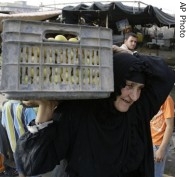-
(单词翻译:双击或拖选)
By Lisa Schlein
Geneva
08 June 2008
The International Organization for Migration1 reports more families displaced by sectarian violence and military operations in Iraq are returning to certain areas of the capital, Baghdad where security has improved over the past few months. But, IOM says these growing numbers still represent a small percentage of the nearly three million Iraqis who remain internally displaced. Lisa Schlein reports for VOA from IOM headquarters in Geneva.
The International Organization for Migration reports more than 4,000 families or some 24,000 people have returned to their former homes in Baghdad's eastern Sadr City in recent weeks. This, despite sporadic4 clashes between Iraqi Forces and insurgents5.
 |
| An Iraqi woman carries a crate6 in a market of the Shiite enclave of Sadr City, Baghdad, Iraq, 02 Jun 2008 |
IOM says most health facilities and schools, as well as some shops, have reopened in Sadr city. It says returns to Baghdad's Rasheed sub-district also are gathering7 momentum8.
IOM Spokesman, Jean-Philippe Chauzy tells VOA the main reasons families cite for returning home include improved security and reconciliation9 among various competing groups, particularly tribal10 leaders, the Iraq Multi-National Force and local authorities.
But, he warns these returns are very fragile and could be easily reversed.
"Anecdotal evidence shows that families who have returned to their areas of o rigin will only be able to sustain themselves if they get enough assistance," said Chauzy. "What we know from experience is that families who have returned will probably consider displacement11 if they feel that security is not adequate in their area of origin or if they feel that they cannot sustain themselves in their home communities. So, there is a big need at the moment to make sure that those returns are sustainable."
Chauzy says access to basic services remains12 very difficult for those who have returned home. He says many children cannot go to school because their parents have lost the ration2 cards that are needed to enroll13 them.
He says many families cannot return to their former homes, either because they were destroyed or are currently occupied by squatters.
Five years after the U.S.-led invasion of Iraq, the country continues to face a displacement crisis. More than 2.7 million Iraqis remain homeless.
IOM calls these people the poorest of the poor. It says they lack shelter, do not receive regular food rations3, and have limited access to drinkable water, medicine and education.
 收听单词发音
收听单词发音
1
migration

|
|
| n.迁移,移居,(鸟类等的)迁徙 | |
参考例句: |
|
|
|
2
ration

|
|
| n.定量(pl.)给养,口粮;vt.定量供应 | |
参考例句: |
|
|
|
3
rations

|
|
| 定量( ration的名词复数 ); 配给量; 正常量; 合理的量 | |
参考例句: |
|
|
|
4
sporadic

|
|
| adj.偶尔发生的 [反]regular;分散的 | |
参考例句: |
|
|
|
5
insurgents

|
|
| n.起义,暴动,造反( insurgent的名词复数 ) | |
参考例句: |
|
|
|
6
crate

|
|
| vt.(up)把…装入箱中;n.板条箱,装货箱 | |
参考例句: |
|
|
|
7
gathering

|
|
| n.集会,聚会,聚集 | |
参考例句: |
|
|
|
8
momentum

|
|
| n.动力,冲力,势头;动量 | |
参考例句: |
|
|
|
9
reconciliation

|
|
| n.和解,和谐,一致 | |
参考例句: |
|
|
|
10
tribal

|
|
| adj.部族的,种族的 | |
参考例句: |
|
|
|
11
displacement

|
|
| n.移置,取代,位移,排水量 | |
参考例句: |
|
|
|
12
remains

|
|
| n.剩余物,残留物;遗体,遗迹 | |
参考例句: |
|
|
|
13
enroll

|
|
| v.招收;登记;入学;参军;成为会员(英)enrol | |
参考例句: |
|
|
|















